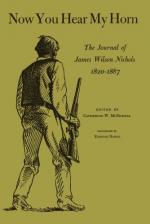|
This section contains 381 words (approx. 2 pages at 300 words per page) |
Encyclopedia of World Biography on James Wilson
James Wilson (1742-1798) was a patriot leader during the American Revolution and an influential delegate at the Federal Convention of 1787. He served on the first U.S. Supreme Court.
James Wilson was born on Sept. 14, 1742, on a farm in Fifeshire, Scotland. His family expected him to become a minister, and at 15 he entered St. Andrews University, but a family crisis interrupted his education. He took passage for America in 1765. In Philadelphia, Wilson turned to law studies; admitted to the bar in 1767, within six months he began practicing in Reading, Pa.
Wilson started his patriotic career in 1774 as head of the Carlisle Committee of Correspondence. In his pamphlet Considerations on the Nature and Extent of the Legislative Authority of the British Parliament (1774) he argued that the colonists, promoting genuine British constitutionalism, were being victimized by a corrupt ministry. He was sent to the Second Continental Congress in 1775. Wilson stood as a moderate but surrendered his early caution on July 2, 1776.
For the next decade, Wilson was mainly committed to the law and to his dream of vast wealth. He speculated in bank shares, land warrants, and similar ventures on borrowed capital. These involvements gave a misleading impression of great wealth, which in turn enabled Wilson to borrow more for speculations. In the Continental Congress he sought a national fiscal policy far sounder than that he personally practiced.
Wilson welcomed the Federal Convention call. He served on the Pennsylvania delegation, was on the powerful Committee of Detail, and was a persistent advocate for the direct election of both Congress and the president. His plan for an electoral college was ultimately accepted. His influence helped carry ratification of the Constitution in Pennsylvania in 1787.
With the establishment of the national government, Wilson vainly hoped to become chief justice of the Supreme Court but accepted an associate justiceship. On the Court he consistently favored the nationalistic position, and in Chisholm v. Georgia (1793) he insisted that states were as liable to a "controlling judiciary" as an individual citizen.
Wilson enjoyed the thrill of speculation but was ultimately unsuccessful at it. His health and his credit began to fail perceptibly. In the winter of 1796/1797, he took flight to escape imprisonment for debt. A defaulted $197,000 debt sent him to jail. He died at Edenton, N.C., on Aug. 21, 1798.
|
This section contains 381 words (approx. 2 pages at 300 words per page) |


